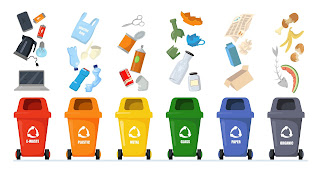10 Things You Didn't Know About Recycling
Recycling is an important part of reducing our environmental footprint. Here are 10 things you may not have known about recycling:
1. Recycling doesn't always take less energy to produce than new products. It takes a lot of energy and resources to turn recycled materials into useful items, so it's important to consider the energy expended versus the value gained when deciding whether to recycle or purchase something new.
2. Recycled materials can be used for more than just making new products – they can also be used in art or construction projects. For example, recycled metals and plastics can be used to create sculptures or architectural features while scrap paper can be turned into creative crafts like origami and paper macheé sculptures.
3. Recycling can actually save money in the long run, and it also helps create jobs. Recycling reduces the need to purchase new materials from suppliers, which makes products cheaper to produce. Recycling industries often employ large numbers of people, providing an additional economic boost for communities.
4. Recyclable items don't just include paper, plastic and glass – you can also recycle electronics like computers, phones and other devices. Consider donating your old computer or cell phone to a local organization that specializes in salvaging parts for reuse or recycling them properly when possible.
5. Recycling isn't just good for the environment – it can even improve your health! Recycled materials like plastics and metals can be used to make products that are free from toxic chemicals. This reduces exposure to harmful substances, which can improve air quality and reduce the risk of respiratory illnesses.
6. Recycling can also help preserve natural resources since new materials don't have to be sourced from nature. Recycled items use fewer resources than their virgin counterparts, so it's important to remember that recycling helps conserve our planet's limited resources.
7. Recycling does more than just save energy – it can also help reduce waste in landfills. Recyclable materials take up less space in landfills, which means there is less need for additional landfill development or expansion projects.
8. Recycling doesn't need to be costly – there are often incentives available for those who choose to recycle. Recyclers may be able to receive cash payments, tax credits or free products for their efforts.
9. Recycled materials can help improve the energy efficiency of buildings and homes. Recycled insulation and other materials can help reduce heat loss from walls and ceilings, making it easier to keep your home warm in winter and cool in summer without consuming extra energy.
10. Finally, recycling is not just about paper, plastic and glass – you can also recycle organic waste like food scraps, yard clippings and even coffee grounds! Composting these items helps create nutrient-rich soil that can be used to grow plants and vegetables, reducing the need for chemical fertilizers.
As you can see, recycling is an important part of helping preserve the planet's limited resources. Recycling also saves energy, reduces waste in landfills and helps create jobs – making it a win-win situation for everyone involved! So next time you're considering throwing something away, remember that recycling might be a better option. It may take a little more effort on your part – but it's worth it for our planet!



Comments
Post a Comment